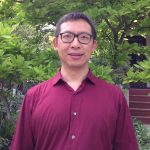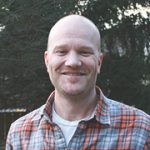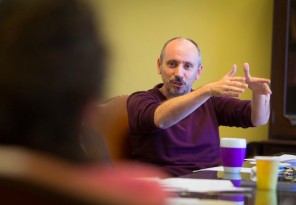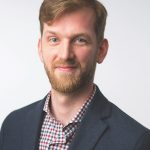New Faculty Seminar Series
Join us for the New Faculty Seminar Series where we will feature the work of new colleagues in the Humanities at UB. By bringing together scholars from a variety of fields, we hope that these seminars will initiate and encourage the development of interdisciplinary conversations.
This brown bag lunch seminar series is free and open to the public; coffee and cookies will be served.
All 2018-19 seminars take place from 12:00 pm to 1:30 pm.
2018 – 19
October 10 | 904 Clemens
 Eero Laine, Theatre and Dance
Eero Laine, Theatre and Dance
“Unconventional Theatrics: Performance Labor and Professional Wrestling”
Professional wrestling has a history that reaches back into the nineteenth century and spans the globe, with Mexico, Japan, and the US, in particular, exchanging wrestlers, performance styles, and verbal and physical vocabularies. Despite fulfilling many of the formal definitions of theatre—it’s scripted, live entertainment performed in front of an audience by actors portraying characters—professional wrestling is often overlooked as such. This talk examines the labor of professional wrestling to reveal the many connections to a range of commercial and globalizing theatre forms beyond an apparent theatricality.
November 8 | 904 Clemens
 Alessandro Sebastiani, Classics
Alessandro Sebastiani, Classics
“Excavating a Roman Sanctuary and a Medieval Castle in Tuscany. The IMPERO Project.”
The aim of the talk is to present the results of the archaeological excavations of the IMPERO Project (Interconnected Mobility of People and Economies along the River Ombrone) in south Tuscany. The Department of Classics is carrying out a number of excavations to understand the settlement network and the economical changes occurred between the late Etruscan period to the late Middle Ages. In order to achieve this, two sites have been chosen: a late Etruscan and Republican sanctuary dedicated to fertility and a deserted Medieval village, located few kilometers away. The lecture will show the current achievements of the project, as well as addressing the future research agenda.
November 27 | 830 Clemens
 Tanya Shilina-Conte, English
Tanya Shilina-Conte, English
‘Abbas Kiarostami’s “Lessons of Darkness”: Affect, Non-Representation, and Becoming-Imperceptible’
In July 2016, when the world awoke to the news of the passing of Abbas Kiarostami, many netizens, including the filmmaker Jafar Panahi, paid tribute to the late director by replacing their avatar on social media with a black screen. This “non-image” stood as a shroud of mourning, but it also contained within itself the very force of Kiarostami’s cinematic art and pedagogy of the image. Kiarostami encourages us to conceive of cinema not in terms of the passive reception of representation, based on the subject-object identification and the “dualism machines” of binary thinking, but rather invites us to approach images through a non-representational lens. In this presentation Shilina-Conte will argue that the black screen sequences in selected films by Kiarostami trigger a process of becoming-imperceptible. This happens through the transfiguration of the surrounding environment and the transformation of registers of perception informed by habitual modes of living and being, including modes of institutionalized reception of images. Her talk will address the deep affinities between Deleuzian philosophy and Kiarostami’s films, placing the latter’s cinema within the recent turn to non-representation and the reframing of regimes of visuality in film-philosophy and media studies at large.
February 6 | 830 Clemens
 John Opera, Art
John Opera, Art
“Where are photographs?”
Increasingly linked to our daily routines, photographs uncannily index and distort the real while mimicking our own biological mechanisms for seeing. Despite their commonly current form as dematerialized screen information, photographs emerged out of the natural world through the harnessing and organizing of observed physical phenomena into a program that produces predictable outcomes. In a time when photography is becoming increasingly non-material and preset, why consider it from a material standpoint? What does it help us to understand?
Starting with the idea that photographic phenomena originated and extend beyond the programmatic space usually associated with the medium today, Opera’s work expands the definition of photography by utilizing its most elemental principles, while staking out discrete territory within the broader field of representational space.
March 13 | 830 Clemens
 Emmanuel Frimpong Boamah, Urban & Regional Planning
Emmanuel Frimpong Boamah, Urban & Regional Planning
“Planning the Postcolony: Planning Dilemma within Africa’s Plural Legal Land System”
This talk presents initial findings from an ongoing project on postcolonial planning and land tenure dilemmas in sub-Sahara Africa (SSA). The work interrogates how plural legal land systems support or constrain practices used to declare areas of value, zones of exception, and property ownership for development purposes. Discussing findings from case studies in Ghana, this talk invites conversations about both the seemingly ‘schizophrenic’ development conditions (e.g. informal settlements) and possible antidotes to the increasingly commodified, plural legal land system in SSA.
April 12 | 830 Clemens
 Jeehyun Lim, English
Jeehyun Lim, English
“James Albert Michener’s Korea”
This talk explores James A. Michener’s journalism and fiction on the Korean War. Unlike the Vietnam War, the Korean War lacks representations that mark its place in American cultural memory. Using Michener’s “Forgotten Heroes of Korea” and The Bridges at Toko-ri (1953) as a case study of the forgotten war’s representation that was widely circulated during its time and viewing them in relation to his other works published in the first phase of the Cold War, this talk examines the conditions of their reception during the mid-twentieth century before suggesting some possible explanations as to why they faded from cultural memory.
May 2 | 830 Clemens
 Meredith Conti, Theatre and Dance
Meredith Conti, Theatre and Dance
“Bullets Over Broadway: Four Guns That Shaped the American Musical”
Employing four incendiary examples of onstage gun use from within the American musical canon, theatre historian Meredith Conti appraises how the popular performance genre variously reinforces and resists enduring tropes imbedded within the nation’s gun culture. In particular, Conti considers the centering and decentering of the country’s naturalized gun handler—the white, Christian, cisgender man—within the musicals’ narratives and spatiotemporal settings, as well as the ways in which theatre artists have utilized the American gun, an object of profound material, political, and symbolic force, as a means of plotting (and spectacularizing) divergent histories of the United States.
2017 – 18
All New Faculty Seminars will be held in 830 Clemens Hall
Thursday, November 16th, 12:00 P.M.
 ADAM ROME
ADAM ROME
Department of History
“DuPont and the Limits of Corporate Environmentalism.”
In 1989, Edgar Woolard began his tenure as CEO of the chemical giant DuPont by calling for a new “corporate environmentalism.” In the future, he predicted, the business world simply would have to be green. He promised that DuPont would undertake a number of eco initiatives, from dramatically reducing production of hazardous wastes to making environmental performance a part of the managerial compensation formula. In the years since, DuPont has won acclaim as a leader in environmental management, including an award from the U.S. Environmental Protection Agency. But critics argue that DuPont still falls far short of being green. Like many corporations, DuPont has improved in some ways while continuing to do poorly in other areas. DuPont’s history can teach us a lot about the limits of corporate efforts to become more environmentally sustainable.
Thursday, February 22nd, 12:00 P.M.
 YAN LIU
YAN LIU
Department of History
“Transforming Poisons in Medieval Chinese Pharmacy.”
A salient feature of classical Chinese pharmacy is its abundant use of toxic substances (aconite, arsenic, etc.). How could poisons become medicines? My talk addresses this question by exploring the rich repertory of techniques devised to transform poisons. Focusing on several Chinese pharmaceutical texts from the 3rd to 10th century, the talk examines the techniques of dosage control, drug combination, and processing that modified the potency of toxins but still preserved their efficacy. In the end, I argue that drugs in Chinese pharmacy were highly malleable substances whose functions varied greatly with technological intervention.
2016 – 17
All Fall 2016 seminars will be held in 830 Clemens Hall
Friday, September 29th, 12:00 P.M.
 CHRISTINE VARNADO
CHRISTINE VARNADO
Global Gender Studies, Department of Transnational Studies
Reading for Desire: What Counts as “Queer” in Renaissance Drama?
Erotic desire saturates early modern English drama, but it has been a challenge to theorize precisely how it is constituted, how we are able to perceive it, and, specifically, how and why some configurations of it may be called “queer.” This talk sheds new light on these questions by moving beyond the common understanding of “queer” as a descriptor for persons or practices, offering a new definition of queerness as a structural quality which inheres in affective and relational modes, and a way to describe desires according to how (not by whom) they are enacted and recognized.
Tuesday, October 18, 12:00 P.M.
 JANG WOOK HUH
JANG WOOK HUH
English
“Color Around the Globe”: Langston Hughes and Comparative Racialization
The Harlem Renaissance, or the New Negro Movement, was not limited to New York but linked to Paris, Kingston, and even Chongjin, a port city in present-day North Korea. Langston Hughes visited Korea in 1933 at the peak of Japanese imperialism. This sojourn enabled Hughes to compare African Americans’ racial dispossession with Koreans’ colonial subjugation. Hughes’s antiracist poems inspired Koreans who were attempting to free themselves from the shackles of the Japanese empire. This talk considers this transpacific legacy of the Harlem Renaissance and the dynamics of antiracism and anticolonialism within a framework of comparative racialization.
Tuesday, November 8, 12:00 P.M.
RYAN MULDOON
Philosophy
“Justice and Diversity”
We live in a world of increasing diversity. Historically, liberal political theory was developed to deal with diversity. However, Muldoon contends that contemporary liberal theory fails to fully appreciate how diversity changes the structure of political communities. There is an unfortunate tendency in liberal theory to assume away our differences. Embracing these differences, and allowing our political institutions to be responsive to them, provides us with a better basis for engaging in a system of social cooperation.
Tuesday, February 28, 12:00 P.M.
 ARIEL NERESON
ARIEL NERESON
Theater & Dance
Democracy Moving: Models of Civic Life in Bill T. Jones’s Lincoln Dances
100 Migrations, a 2008 site-specific performance at the University of Virginia about Abraham Lincoln’s legacy in the Obama-era United States, is a study in what choreographer Bill T. Jones terms “democracy moving.” Nereson examines the cultural and cognitive scripts of emotion, reason, empathy, and identity that converge at the site of embodiment in the work’s rehearsal and performance. She proposes that the dance theorizes feeling and moving as yoked practices of relating to and understanding the historical past in order to enact radical models of civic life in the present.
Wednesday, March 8, 12:00 P.M.
 CHAD LAVIN
CHAD LAVIN
English
Relative Values: On Ethics, Economics, and Politics
This talk explores philosophical liberalism as an ideological system comprising three distinct modes of valuation—ethics, economics, and politics. Lavin argues that much as the tools of industrial manufacture led to the specialization of human labor, the tools of liberal philosophy led to the specialization of social analysis and the compartmentalization of these modes of valuation. To make this case, Lavin examines the development of economics as an academic discipline and the cultural capital enjoyed by the social sciences over the humanities.
Thursday, April 20, 12:00 P.M.
 STEPHANIE SCHMIDT
STEPHANIE SCHMIDT
Romance Language & Literatures
González de Eslava’s Christian Allegory of the Gran Chichimeca: Reimagining the Ancestral North in New Spain
The Fifth Spiritual and Sacramental Colloquy of Fernán González de Eslava is a Christian allegorical drama set in New Spain of the 1570s. This play about Spanish attempts to fortify the northern frontier incorporates striking elements of indigenous lore. Schmidt notes that the play invokes northern Chichimec warriors of Eslava’s day who maintained an ongoing resistance against Spanish incursions, while engaging symbolically the legendary Chichimec ancestor of Nahua histories. Thus, Eslava reproduces key features of an indigenous foundational narrative about the North as a place of origin for various peoples of the Mexican Basin, yet he revises this narrative, asserting Christianizing, colonizing claims.
2015 – 2016
Tuesday, October 20, 3:30 p.m.
830 Clemens Hall
Fernanda Negrete, RLL
“Clinical Aesthetics: Psychoanalysis, Schizoanalysis, and Art’s Work on a Body”
The notion of a body and its health as a problem of desire is central to both modern art and psychoanalysis, two fields that emerge simultaneously in Western culture. Gilles Deleuze adopts Antonin Artaud’s term “body without organs” to articulate the potential in modern art and literature to challenge the preservation of traditional values.Although Deleuze calls for an aesthetic clinic apart from that of psychoanalysis, psychoanalysis’ address of the body in terms of desire and language provides keys for understanding the forceful intervention of the aesthetic in the social sphere.
Tuesday, November 10, 3:30 p.m.
830 Clemens Hall
Henry Berlin, RLL
“Confession and the Rhetoric of the Passions in Late-Medieval Iberia”
The turn of the fourteenth century in Castile saw the dramatic rebirth of courtly poetry among the aristocracy and other lettered classes.This genre had already flourished centuries earlier in Languedoc, Portugal, and Aragon, and scholars seeking to explain its Castilian resurgence have described an essentially nostalgic and even anachronistic phenomenon. In contrast, through a reconsideration of the relationship between lyric poetry and confession, Berlin argues that the affective rhetoric of this corpus constitutes a mode of resistance to the emerging dominance of the individual ego.
Monday, February 1, 3:30 p.m.
830 Clemens Hall
Nicholas Lustig, Geography
“City of ‘Impudent If’: The Dream of Justice and the Endless Search for the City in the Poetry of Nathaniel Mackey”
This talk discusses the intersection of politics, desire, and the city in the work of contemporary African-American poet Nathaniel Mackey. In Mackey, the city becomes a memory, ideal, delusion, and spur for a wandering collective that seeks a place and practice of justice.This talk examines the evolution of the city in his work, contrasts it to competing notions such as Ezra Pound’s City of Dioce and a traditionalist “shining city on a hill,” and considers the resonances of Mackey’s work with recent events of violence and uprising in American cities.
Monday, March 7, 3:30 p.m.
830 Clemens Hall
Jacob Gallagher-Ross, Theatre&Dance
“Mediating the Method: Lee Strasberg, Marlon Brando, and the Sound of Authenticity”
Method acting, the mid-twentieth-century performance style developed at the Actors Studio in New York City, was both renowned and reviled for its monomaniacal pursuit of emotional authenticity in performance, sacrificing textual integrity, and sometimes even intelligibility, to feeling; Marlon Brando’s infamous mumbling is a case in point. But our obsession with the Method’s psychological contortions can cause us to overlook its creative dialogue with new technologies. In this seminar, Gallagher-Ross considers the media behind the Method. Recording undergirded the exercises and thought of Lee Strasberg, the Method’s Svengali. And Brando’s mumbling, upon closer scrutiny, reveals itself as a canny sound experiment.
Monday, March 21, 3:30 p.m.
830 Clemens Hall
Lindsay Hunter, Theatre&Dance
“This is not a threat: performing reality in Conspiracy For Good”
In the 2010 alternate reality game Conspiracy For Good, players aligned against a fictional corporate villain bent on surveilling British citizens.The game scenario identified consumer surveillance technology as troublesome in the hands of the game’s overtly malevolent villain, but simultaneously as a powerful tool for resistance of corporate overreach when deployed by consumers.This presentation considers the potential for this and other alternate reality games to define and orient the subjectivities of their players, and in particular to place both players and the game’s sponsor, Nokia, in specific relationships to surveillant practices.
Spring 2015
Tuesday, March 31, 3:30pm
830 Clemens Hall
Jasmina Tumbas, Art
“Countering Persecution, Misconceptions, and Nationalism: Contemporary Roma Activist Art”
This presentation considers the role of art and activism within the contemporary Roma and Sinti community in Europe. Given the recent resurgence of Anti-Romaism worldwide, this talk focuses on contemporary Roma artists and their allies who thematize, expose, and confront social and political injustices, while simultaneously fighting against primitivizing and racist stereotypes of Roma and Sinti constructed by non-Roma over centuries (“Gypsy Witch,” “Global Nomads,” “Fortune Tellers,” “Parasites,” or “Unsocial/Asocial”). As such artists’ works frequently clash against a number of ideological fronts and complicate political alliances with the New Left and human rights organizations, this paper seeks to challenge such political relationships within the sphere of art and activism.
Wednesday, February 11, 3:30pm
830 Clemens Hall
Alyssa Mt. Pleasant, Transnational Studies
“Haudenosaunee Responses to the ‘Civilization’ Policy, Colonial Schooling, and Agricultural Transformation”
The US government’s “civilization” policy during the eighteenth and nineteenth centuries was a crucial element of its territorial expansion that has received too little scholarly attention. Drawing on oral and written testimony as well as material culture, Mt. Pleasant analyzes this policy through the lens of Haudenosaunee history. Paying particular attention to agricultural practices, she shows that Haudenosaunee people clearly comprehended the fundamental threat posed by the “civilization” policy, along with its model families, farms, and schools. In response to this policy, they developed a range of strategies to minimize its threat while simultaneously utilizing some innovations to preserve distinct social and political identities, as well as tribal homelands.
Wednesday, March 11, 3:30pm
830 Clemens Hall
Alexander Green, Jewish Thought and Heritage
“Contemporary Virtue Ethics and Medieval Jewish Thought”
Over the last fifty years, Western ethical and political thinkers have been strongly critiqued for their dependence on universal moral laws and have subsequently undergone a major shift to focusing on either individual or cultural difference. Leading advocates of both of these responses to modern law-based ethics have in turn responded by reconstructing an ethics of character out of elements of Aristotle’s ethics of virtue. However, a close look at these models shows that they contain certain inherent paradoxes. A turn to medieval Jewish thought offers a way of helping to resolve these tensions and may provide a more balanced approach to modern ethical dilemmas.
————————————————————————————————————–
Fall 2014
Tuesday, September 16, 3:30pm
830 Clemens Hall
Paige Sarlin, Media Study
“Between You and We: Collectivity and the Filmed Interview”
Since the 1960s, media interviews have played an important role in bringing the first person singular to the foreground of social and cultural discourse. Looking at feminist documentary films from the 1970s, this paper explores how the filmed interview also operates as a structure for collective identification. Sarlin focuses in particular on the importance of direct address and the shifting usage of pronouns to argue that these films make public the politics of the personal in ways that challenge the reduction of feminist critique to a form of identity politics.
Spring 2014
Cecil Foster
Transnational Studies
Tuesday, February 11, 3:30PM
830 Clemens Hall
(CANCELED)
Genuine Multiculturalism: Striving for Comedy in the Tragic Human ConditionThe paper will be available on online reserve under HIS000.
Fred Klaits
Anthropology
Wednesday, March 12, 3:30PM
830 Clemens Hall
God and Therapy in an American Pentecostal CongregationThe paper will be available on online reserve under HIS000.
Marla Segol
Transnational Studies
Wednesday, April 9, 3:30PM
830 Clemens Hall
Beautiful Bodies, Human and DivineThe paper will be available on online reserve under HIS000.
Fall 2013 Schedule
Lewis Powell
Philosophy
September 18, 3:30PM
830 Clemens Hall
Malebranche vs. Hume on Whether Belief is VoluntaryMany early modern philosophers were concerned with the question of whether we have voluntary control over our beliefs. Rene Descartes maintained that belief was voluntary, and appealed to this feature of belief to ensure that mistaken beliefs were attributable to errors on our part, rather than on the part of God. David Hume denies that we have voluntary control over our beliefs, because we cannot form beliefs at will, and because introspection does not reveal to us a unique decision preceding each and every judgment we form. This paper examines the relationship between Hume’s challenges to voluntarist accounts of belief, and the innovative version of voluntarism put forward by Nicholas Malebranche, arguing that Malebranche’s approach can sidestep the challenges raised by Hume.The paper will be available on online reserve under HIS000.
Katja Praznik
Arts Management
October 9, 3:30PM
830 Clemens Hall
Autonomy or Disavowal of Socioeconomic Context? The Precarity of Cultural Workers in Slovenia since the 1980sCultural workers often criticize capitalist modes of production, but they often don’t apply that criticism to their own working conditions. They tend not to see their production process as part of the capitalist system because they understand themselves as situated in an autonomous social sphere. This paper scrutinizes this claim for the autonomy of arts and cultural production in Europe by focusing on the position of freelance cultural workers and artists during the period of transition from self-managed socialist Yugoslavia to the independent nation state of Slovenia. Drawing upon policy analysis and fieldwork, this paper argues that the claim for the autonomy of art is in fact a structural disavowal of the socioeconomic context and therefore a reaction against rather than a progressive response to the destruction of the welfare state during past three decades.The paper is available on online reserve under HIS000.
David Alff
English
December 3, 3:30PM
830 Clemens Hall
Paper Projections: Aaron Hill’s Beech Oil Bust (1714-1716)This essay examines the role of print in the attempted invention of a new eighteenth-century commodity: beech seed oil. It shows how the inventor, Aaron Hill, exploited the material conventions of patents, pamphlets, newspapers, and panegyric poetry to promote beech forests as a cheap source of lubricants for use in Britain’s woolens and soap-making industries. Although this enterprise failed (and disastrously so), its archival remains shed incredible light upon the rhetorical life of an eighteenth-century corporation. Analyzing the folds, fonts, binding, images, and sales venues of beech oil proposal literature, this essay argues that print was an enabling force of entrepreneurship in eighteenth-century Britain, and that publishers, printers, and printed objects themselves were active agents in shaping the composition and reception of projects to improve the nation.The paper is available on online reserve under HIS000.
Spring 2013 Schedule
Victoria Wolcott
History
March 5, 3:30PM
830 Clemens Hall
“Radical Nonviolence, Interracial Utopias, and the Long Civil Rights Movement”Historians have long recognized that utopian communities in antebellum America played key roles in emerging abolitionist and women’s rights movements. A largely unrecognized parallel utopian movement occurred in the middle of the twentieth century, when white pacifists and black activists formed interracial communities in cities, suburbs, and rural areas. Participants in these communities pioneered distinctly American forms of Gandhian nonviolence to further the cause of racial equality. This paper examines a range of urban interracial communities during and after World War II that challenged spatial segregation and put forth a radical vision of equality and economic justice.The paper is available on online reserve under HIS000.
Fall 2012 Schedule
Marion Werner
Geography
Wednesday, October 24, 3:30PM
830 Clemens Hall
“Reproducing Difference, Reproducing Capital: New geographies of export production in the Dominican Republic and Haiti“In recent years, rising global competition has provoked the retrenchment of thousands of low-wage workers in the export assembly industry in the Dominican Republic, while Haiti has emerged as a site for trade zone production, particularly following the 2010 earthquake. These shifts are part of new, inter-connected investment patterns and labor geographies between the two countries in relation to transnational capital. Consistent with the island’s history, the difference in the respective positions of Haitian and Dominican labor in circuits of capital accumulation is a key basis for generating profits. Following Marxist, feminist and Dominican scholars, I argue that this difference – at once gendered, racialized and constituted as national — must be continually reproduced through social and spatial practices. Drawing upon ethnographic fieldwork and policy analysis, I explore how government officials, factory managers, owners and development policymakers construct these new social and spatial geographies of profitmaking on the island, as well as the ways that these logics may be contested.This paper will be precirculated through UB’s Online Course Reserve system under HIS000-SEE.
Walter Hakala
English/Asian Studies
Tuesday, November 27, 4:00PM
830 Clemens Hall
A Sultan in the Realm of Passion: Coffee in Eighteenth-Century DelhiIt is naught save the beloved of the noble It is always irked by the companionship of the low
In whatever place has ‘Hatim’ two breaths of life,
Here will be a sip of coffee, there a puff at the huqqah
Thus concludes a poetic encomium to coffee composed by the eighteenth-century Urdu poet, Shah ‘Hatim’ (1699-1783), who enjoyed a long career, interacting with multiple generations of Urdu poets in Delhi and observing firsthand the massive economic and cultural upheavals that accompanied the rapid political decline of the Mughal empire. He is remembered today primarily for his claim, made some twenty years after he composed this poem, to have purged his earlier collections of poetry of verses that contained “unliterary” vocabulary and outdated puns. This poem’s survival in his revised divan helps to answer questions about broader efforts by professional poets of Urdu to document emerging modalities of urban connoisseurship for new audiences and patrons in regional centers.
This paper will be precirculated through UB’s Online Course Reserve system under HIS000-SEE.
Spring 2012 Schedule
“Imaging Berlin. Urban Demolition in Berlin Photographs 1871 – 1918”
Miriam Paeslack
Arts Management
March 21, 3:30PM
830 Clemens Hall
Download pre-circulated paper here:
This paper interprets the city of Berlin as a palimpsest, as an urban space that contains traces of demolition and rebuilding during Wilhelmine Berlin, the era between 1871 and 1918 when Germany was first united and governed as a constitutional monarchy. It looks at the kinship between photographs and paintings of ruins and destruction to explore how history was invoked in pictorial representations of the city. This paper explores the connection between historical memory and identity and its relation to Germany’s unification.
Fall 2011 Schedule
“Lucid Cameras: Imaging Haiti After the Earthquake of 2010”
Toni Pressley-Sanon
African and African American Studies
October 12, 3:30 PM
830 Clemens Hall
“The Souls of Black Comix: The Secret Origins of Representation as Resistance in the Black Age of American Comics”
John Jennings
Visual Studies
November 16, 3:30 PM
830 Clemens Hall
“Traumautism: Recovering (from) Bruno Bettelheim’s Legacy”
Joseph Valente
Professor, English
March 23, 2011, 3:30 PM
830 Clemens Hall
As part of the UB Humanities Institute’s New Faculty Seminar Series, Joe Valente, Professor of English, will speak on: “Traumatism: Recovering (from) the Legacy of Bruno Bettelheim.” The lecture will take place tomorrow on Wednesday, March 23rd at 3:30pm in 830 Clemens. Professor Valente, who recently joined the UB faculty from the University of Illinois, Urbana-Champaign, is an internationally renowned scholar of Joyce, Irish literature and Modernism. The author of several books, Professor Valente’s most recent book is The Myth of Manliness in Irish National Culture, 1880-1922 (University of Illinois Press, 2011).
Professor Valente’s forthcoming talk is on his new work on autism studies, which revisits Bruno Bettelheim’s psychogenic theory of autism, which has been discredited and even demonized. What is the reason behind these now gratuitous assaults? As untenable as Bettelheim’s study The Empty Fortress is, it speaks to features of infant development and sociality that contemporary autism studies has had to exclude to constitute itself as a coherent scientific field—features, accordingly, that continue to threaten that coherence.
“The Sexuality of Abstraction: Agnes Martin”
Jonathan Katz
Associate professor, Visual Studies
October 6, 2010, 3:30 PM
538 Clemens Hall
The first speaker of the fall semester is Jonathan Katz, Associate Professor, Visual Studies. Jonathan’s lecture is entitled “The Sexuality of Abstraction: Agnes Martin”. The palpable disconnect between the rigidly formal terms of Agnes Martin’s art and her metaphysical pronouncements about it have generally been met with an embarrassed silence. She made her rigorous grids the occasion of some the most high-flown rhetoric ever uttered by a post war artist, a period already celebrated for its art of numinous intensity. While some have sought to recuperate her metaphysics in art historical terms through an equally mystical phenomenological account of the work (e.g., Rosalind Krauss), few have sought to historicize and contextualize Martin’s deployment of mysticism. A broader social-historical accounting is clearly called for, and queer studies offers a powerful new tool for understanding the utility of the spiritual in Martin’s oeuvre. This paper marries phenomenology, Zen Buddhism, Gertrude Stein, Freud and Nietzsche towards explicating how Martin’s lesbianism structured her turn, late in life, toward an art of geometric abstraction.
“Italian Futurism: Performances in Intermedial Spaces”
Laura Chiesa
Assistant Professor, Romance Languages and Literatures
November 17, 2010, 3:30 PM
830 Clemens Hall
The second speaker of the fall semester is Laura Chiesa, Assistant Professor, Romance Languages and Literatures. In her lecture “Italian Futurism: Performances in Intermedial Spaces, Dr. Chiesa will present her work in progress on the intermedial spatial theatricality of Italian Futurism. The architectural space of the Italian Futurists is known principally for Sant’Elia ground-breaking manifesto and drawings, which have been considered to be the real roots of unrealized modernism (Banham) or, more recently, as a totally new way of understanding the complex modernist space (Kwinter). During the inter-war years, Italian Futurism didn’t embrace modernist functional or rationalist architecture. Instead, it experimented in the space of theater bringing to the stage abstract, ephemeral and invisible constructions with a dynamic marked by interruptions, jumps and distortions. In the late ’70s, artists (i.e. Goldberg) and experimental architects (i.e. Tschumi) reconsidered this performative aspect of Italian Futurism. The presentation will be dedicated to the analysis of theatricality at play in these Futurist experimentations. While such theatricality always dwells in-between medias and experiments in an interdisciplinary way, it uncannily stretches between extremes: from abstract, or even utopian, intermedial spaces to fascist and propagandistic spaces. This link is for one of Chiesa’s recently published articles which is an in depth analysis of an artist/writer work between1928-1930. The paper will be discussed and expanded upon in relation to Chiesa’s work on spatial/architectural performance in Futurism.
“From Exile to Odyssey: A Cuban insurgent’s journey home in the circum-Caribbean”
Dalia Muller
Assistant Professor of History
February 23, 2010, 3:30 PM :: 830 Clemens Hall
“Building Socialist Modernity: Politics and Urban Design in Chile, 1970-1973”
Camilo Trumper
Assistant Professor of American Studies
March 16, 2010, 3:30 PM :: 830 Clemens Hall
“Technospectacular Poetics: From Mallarmé to Bernstein”
Jean-Jacques Thomas
Melodia E. Jones Professor of French
October 7, 2009, 3:30 PM :: 830 Clemens Hall
Jean-Jacques Thomas, the Melodia E. Jones Professor of French, specializes in poetry and poetics, nineteenth and twentieth-century French literature and culture, as well as Quebec and Canadian Studies. He has taught at the Université de Paris-VIII, the University of Michigan, Columbia University and Duke University. He has published several books on poetics and contemporary French literature, most recently Poeticized Language with Steven Winspur. He has two forthcoming books, one on the Haitian-Quebecois poet Joël Des Rosiers and the other on Jacques Roubaud, a French poet and mathematician.
“Jewish Translation: Philosophy, History, and the Space In-Between”
Aaron Hughes
History
November 18, 2009, 3:30 PM :: 830 Clemens Hall
Aaron Hughes, Associate Professor of History and the Gordon and Gretchen Gross Professor of Jewish Studies, specializes in medieval Jewish and Islamic Neo-Platonists, comparative religions, and more recently, the Jewish intellectual history of the Italian Renaissance. Professor Hughes arrived from the University of Calgary, where he spent the previous eight years. He is the author of The Art of Dialogue in Jewish Philosophy (Indiana 2008), Situating Islam: The Past and Future of an Academic Discipline (London: Equinox 2008); Jewish Philosophy, A-Z (Palgrave 2005); The Texture of the Divine: Imagination in Medieval Islamic and Jewish Thought ( Indiana 2004). He also has two edited collections forthcoming this year: New Directions in Jewish Philosophy with Elliot R. Wolfson (Indiana 2009) and Defining Judaism: A Reader (Equinox 2009).
Fall 2008 Schedule
November 12
1:00 PM
830 Clemens Hall
“Democracy in Ancient Greece”
David Teegarden, Classics
University at Buffalo
The text for the discussion is available on request.
Humanities Institute New Faculty Seminar Series
October 15
1:00 PM8
30 Clemens Hall
“The Queer Pleasure and Frustrations of Chang and Eng’s Autopsy”
Cynthia Wu, American Studies
University at Buffalo
The text for the discussion is available on request.
Humanities Institute New Faculty Seminar Series
Spring 2009 Schedule
March 4
1:00 PM
830 Clemens Hall
&”‘The Excellent Habit of Thrift’: Wall Street and the Technology of Imperialism”
Peter Hudson, African-American Studies
University at Buffalo
New Faculty Seminar Series
April 8
1:00 PM
830 Clemens Hall
“‘I want to be a Cowboy’s Sweetheart’: Patsy Montana and the Freedoms of the West”
Stephanie Vander Wel, Music
University at Buffalo
New Faculty Seminar Series
Save





























